These sun gods are being so unreasonable.
So what if they’re ancient and used to be the center of Sun worship for thousands of years? That doesn’t mean that they own the ball of flames!
But “it was just hanging there in the sky with nobody’s name on it. Everybody knows what that means — finders keepers!”
The sun is the source of all light and life… Maybe…
Suddenly, your entrepreneurial spirit awakens.
You could sell the sun for gazillions. Maybe to a local agricultural society or the government? Perhaps an evil overlord!
Though before anyone can get their mitts on a single ray of sunshine, you still have to get past the Sun gods and goddesses, aka the solar deities, just waiting to present their mythology as credentials that they are the true guardians of the sun.
Table of Contents
Ra — The Egyptian Sun God
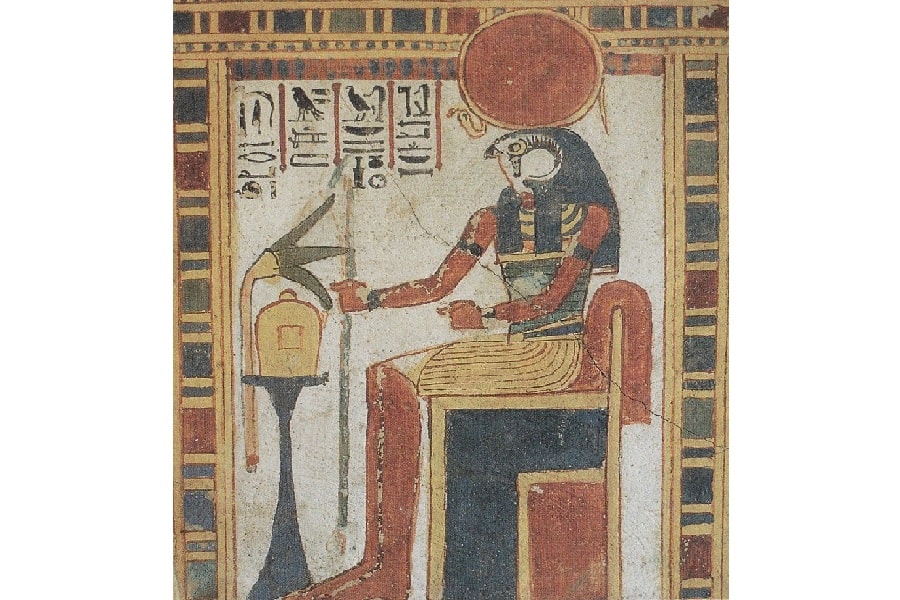
Name: Ra
Religion: Ancient Egyptian Gods and Goddesses
Realms: Sun god, creator of everything
Family: He even created himself
Fun Fact: Ra’s worship was so central to ancient Egypt that some historians suggest the culture had a monotheistic religion, with Ra as the only supreme deity.
It’s tough not to feel intimidated as you face down the most important god from ancient Egypt. He doesn’t exactly look human despite having the body of a man — he gazes at you with the face of a falcon and there’s a cobra sitting on his head.
Thankfully, the snake is a sign of royalty and authority, which is why there are so many snake gods in Egyptian mythology. It’s not a hat that doubles as a weapon — which is a good thing, because the Sun god Ra is definitely not pleased with you.
Well, you are selling his property.
You tell him (very respectfully) that anyone can make that claim. It’s not sufficient evidence that he steers the sun as his own personal chariot across the sky every day. You can shovel coal into a locomotive and puff it down the tracks — that doesn’t mean you invented and thus own the train.
Ra cannot produce a patent number. This upsets him because the ancient Egyptians needed no such legalities; they were convinced that their Sun god had shaped the entire cosmos. True enough, Ra was powerfully connected to the sun, and everything from the disk on his head to his left eye symbolized the fiery ball in space. The people built countless temples in his honor as Ra represented life, warmth, and growth.
Fine, you get it. He was a hot god. It still doesn’t prove anything.
READ MORE: Ancient Egypt Timeline
Sol — The Norse Sun Goddess
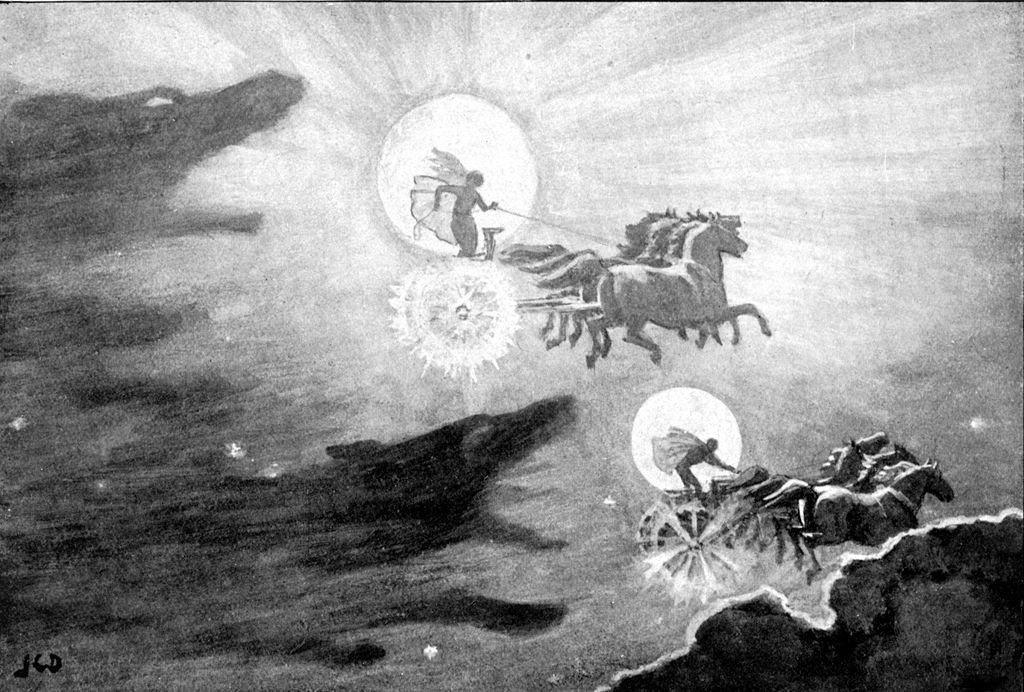
Name: Sol
Religion: Norse Gods and Goddesses
Realms: Sun goddess
Family: Her twin brother is Mani, the Norse moon god
Fun Fact: Her most famous legend (she had to steer the Sun chariot as punishment for her father’s arrogance) could be a medieval invention and not an authentic story from pre-Christian times
A pair of twins is up next. The brother, Mani, makes no attempt to take the sun off the auction block — he’s a moon god, so this isn’t really his problem. But his sister is pretty steamed.
Sol is the reigning goddess of light and the solar deity in Norse mythology. It’s bad enough that two lethal wolves chase her chariot across the sky every day; now she has to convince a mere mortal to give back her wheels. Yep, she’s got the sun as a ride too.
Sol stamps her foot in anger. You had better give her chariot back, otherwise, she’s gonna have to use that foot (and the other one) to walk all the way back to the realm of the Norse gods and goddesses after meeting with you.
She points out that the sun is hers since the gods created the day, night, year, and phases of the moon to give the twins something to do after they were born. You shake your head — just because somebody has a job doesn’t mean that they own the company car.
That’s right. You’re fighting a solar goddess with clever vehicle comparisons.
READ MORE: The Vanir Gods of Norse Mythology
Helios — The Sun God of the Greeks
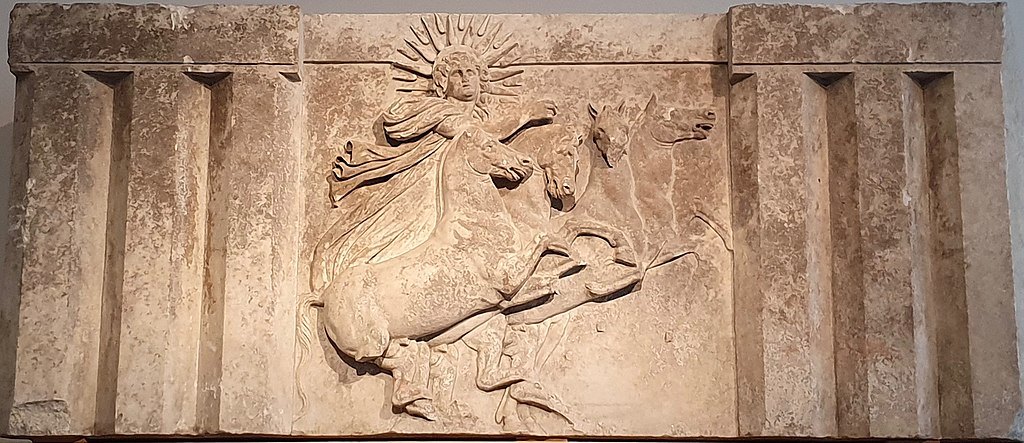
Name: Helios
Religion: Greek Gods and Goddesses
Realms: God associated with the Sun
Family: Son of Hyperion and Theia
Fun Fact: In his honor, athletic games were held on the island of Rhodes every five years
Helios is having none of your clever words. He promises to smite you should you try that funny business on him or any of the other gods and goddesses again. In fact, if you defy him, he plans on feeding you to the dragons, which pull him around in lieu of a horse-drawn chariot.
This is also the same vessel that unfortunately killed his son Phaethon when the youngster failed to control the horses and Zeus struck him down. Zeus wasn’t being mean — had he not destroyed Phaethon, the careening solar chariot would’ve set the world on fire.
To make matters worse (or his mood, rather), Helios wasn’t widely worshipped. Other cultures put their solar deity on a pedestal. But the Greeks? It was a little beneath them; they viewed Sun worship as something the barbarian hordes did.
However, Helios, a Titan god, had a strong following and was the patron deity and city god on the island of Rhodes where his famous bronze statue guarded the harbor. The huge figure was among the Seven Wonders of the Ancient World until an earthquake did away with it.
You send Helios the sun god on his way. If anything, he must be blaming the ancient Greeks for their vague sun worship and lack of scrolls — those maybe would have helped, if they clearly stated whether he did or did not own the sun.
READ MORE: Ancient Greece Timeline
Arinna — The Hittite Goddess of the Sun
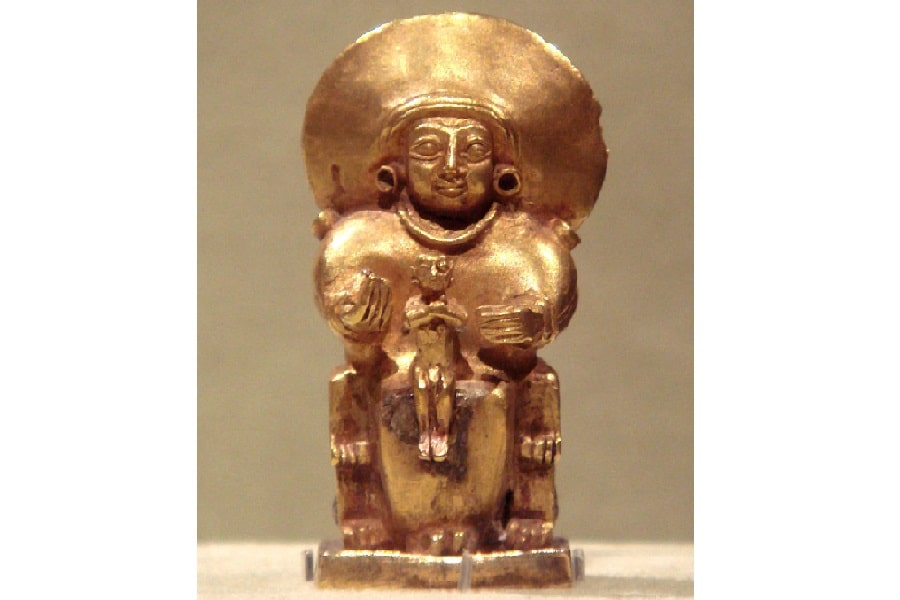
Name: Arinna
Religion: Hittite Mythology
Realms: Sun goddess
Family: Wife of Tarḫunna; mother of Mezulla, Nerik, Zippalanda, and Telipinu
Fun Fact: Royal couples donated disks of precious metal, representing the sun, to her temple every year
Arinna is okay with the whole idea of selling the sun. As a goddess of light, she’s different from most other sun gods. Instead of bringing daylight with a chariot, Arinna soaked up the worship of royals.
But to keep her toe in the pie, she must have a link to the sun — and that’s why she’s bargaining for shares. That way, she’ll stay a Sun goddess no matter who you sell the giant lightbulb to.
Arinna’s vanity shouldn’t be too surprising. Together with her husband, she was the most important deity in Hittite culture. Kings prayed to her every morning, were crowned in her sacred city (graced with the same name as the goddess), and acted as her priest on Earth. And on top of all that, queens became her priestesses. Heck, Arinna was even called the “Queen of all lands.”
You tell her that you will consider the offer. Especially after she promises to pay with statues of golden deer — which she has a lot of. The animal was sacred to her and given to the goddess throughout the ages when she was still worshipped.
Surya — The Hindu Sun God
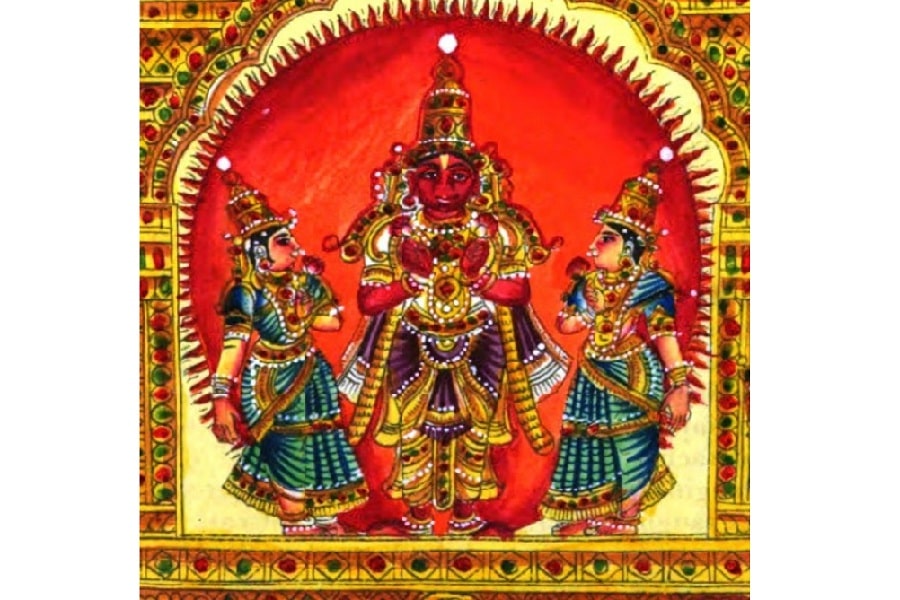
Name: Surya
Religion: Hindu gods and goddesses
Realms: God associated with the Sun
Family: Father of Yama, the god of death; married to Samjna
Fun Fact: When his wife left him, Surya stalked her as a horse
Surya is used to dealing with demons — he slays the creatures with each morning sun to end the darkness and herald each new day. Right now, he’s not making any exceptions between the demons that bring nighttime and you, a mortal who had the audacity to bag the sun.
But he can’t slay a human without disrespecting those who built many temples in his honor. He was once worshipped widely as the creator of the universe (never mind what Ra says in that regard) and as the soul that radiates warm light on Earth. He has another plan to deal with you.
You might be a sun-snatcher, but this just means you’re wily, not that your IQ is rock bottom. You listened when Ms. Proponsky in first grade read stories about Surya.
So, when he offers you a jewel called the Syamantaka gem — in exchange for the sun — and says it makes heaps of gold every day, you know it’s true. But you refuse because the jewel only works for good people, otherwise, instead of gold, the owner is consumed by deadly consequences — and you’re no longer so sure that you didn’t poach the sun.
Huitzilopochtli — The Aztec God of the Sun
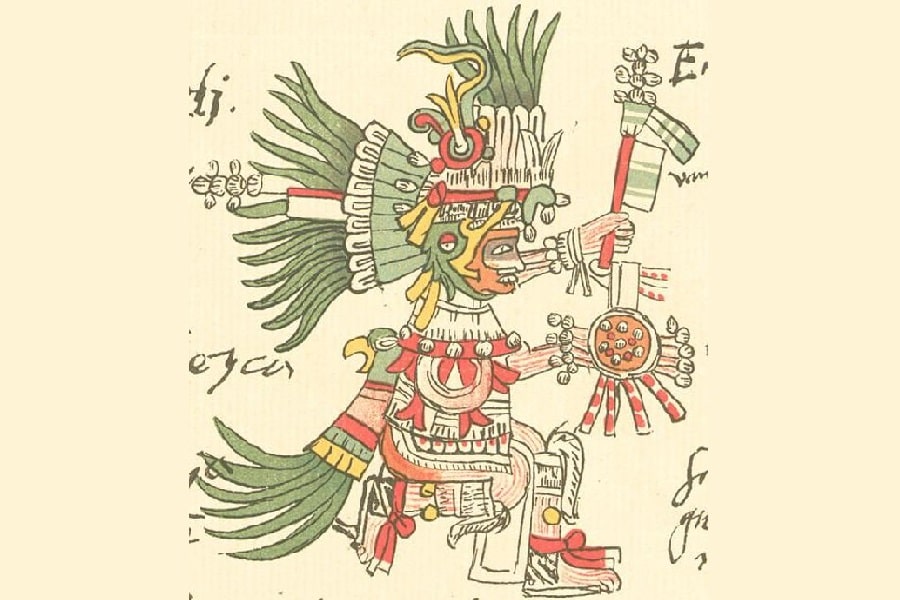
Name: Huitzilopochtli
Religion: Aztec gods and goddesses
Realms: God associated with the Sun, also consider a war god
Fun Fact: His name means “Hummingbird on the Left”
The gods and goddesses send in Huitzilopochtli to grow your doubt — don’t think they didn’t spot your weak moment. And this Aztec sun god is uniquely qualified to ply you with guilt. At first, he’s nowhere in sight, but then a tiny hummingbird flutters closer.
This boggles your mind. He introduces himself, so you know that this is Huitzilopochtli — but how can any of the Aztec gods be this cute? When you heard that the Aztec deity of light and war was headed your way, you kind of expected a gore-fest.
READ MORE: Aztec Religion
(Just give it a minute…)
But it turns out Huitzilopochtli doesn’t take the form of a bird because the Aztecs thought he loved nectar. Yeah, as the god of war, he was responsible for warriors and when they died, they supposedly came back as hummingbirds. This gets a little darker, though — the Aztecs were also convinced that successful Sun worship needed a little… assistance.
As the solar deity, he was always in danger of being overcome by the darkness. So, the Aztecs offered a helping hand — to keep the god strong, he was regularly given blood from a human heart as a meal (with human sacrifice being the easy way to attain this delicacy).
READ MORE: Aztec Mythology: Important Stories and Characters
The hummingbird shrugs. If you keep the sun, he’ll fall into darkness — and more darkness equals more human sacrifices. He mentions all those poor, innocent people with jobs and dreams and families, all destroyed because of your selfishness.
He’s really laying the guilt on thick and you know the Aztecs don’t drag people up sacrificial steps anymore… but the terrifying little bird finally convinces you that your tango with the Sun gods and goddesses maybe sorta wasn’t a good idea.
Read More: The Aztec Empire
Inti — The Incan Sun God
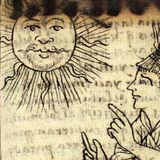
Name: Inti
Religion: Inca mythology
Realms: Sun god
Family: Created by Viracocha, the supreme deity in Inca mythology; married to the moon goddess Quilla
Fun Fact: Gold was believed to be the sweat of this god
Inti loves rituals and wants you to participate in one. Thankfully, to your fried nerves, this solar deity is a benevolent Incan deity. He gracefully doesn’t tell you what people used to sacrifice to him — and, frankly, you don’t want to know.
Now that you’ve agreed to give back the sun, Inti wants to have an official ceremony. But where to hold it? As the all-powerful god of their culture, the Inca raised temples and monuments to Inti everywhere. He’s really spoiled for choice but, in the end, he takes you to the famous Inca citadel Machu Picchu.
READ MORE: Native American Gods and Goddesses: Deities from Different Cultures
The air is a little thin up in the mountains, but at least he didn’t haul you up bloodied steps. Instead, you stand in front of a weird-looking stone thing. He calls the pointy carving an Intihuatana or “hitching post of the sun.”
During the ceremony, he ties the Sun to the Earth but complains all the way. Inti isn’t used to doing the ritual himself — he used to have both male and female priestesses to help out. Even Inca rulers did things for him.
A solar eclipse appears and he apologizes — it happens when he’s displeased.
That’s probably not good… Dangerous sacrifices tend to happen around Mesoamerican gods and their eclipses. You suggest he thinks of a good memory, and he fondly recalls the days when the Incas conquered other nations and used his mythology to suppress them. Good times.
Okay, that’s not really what you meant — but at least the eclipse is gone.
READ MORE: Pyramids in America: North, Central, and South American Monuments
Kinich Ahau — Mayan Sun God
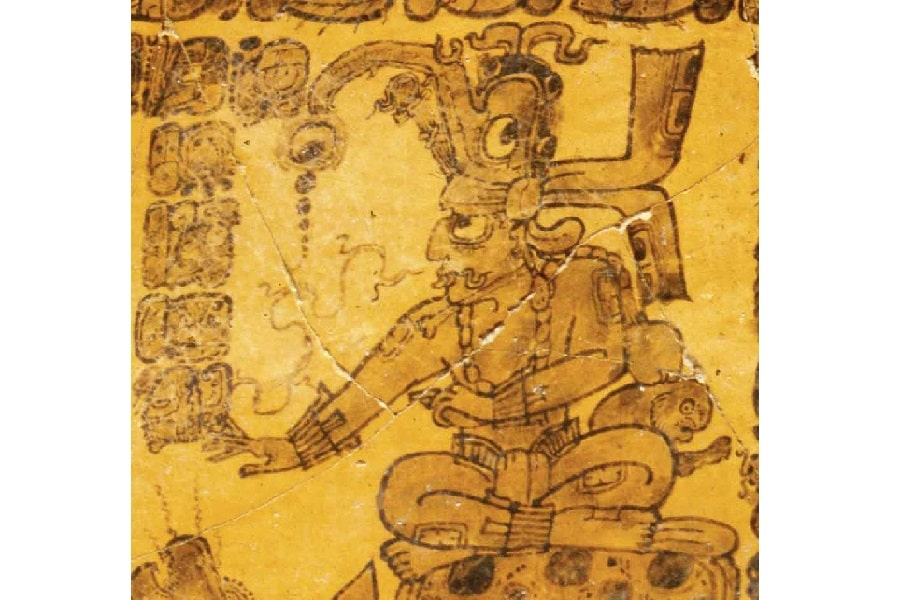
Name: Kinich Ahau
Religion: Mayan mythology
Realms: Solar Deity
Family: Elder brother of the upper god, Itzamna
Fun Fact: Maya artists depicted him as being cross-eyed
While Inti packs away his ritual stuff, another Mesoamerican god appears. Kinich Ahau looks to be middle-aged with a curvy nose and big square eyes. Being a Maya god, you’re not surprised that he’s a little creepy — even one of his upper incisor teeth is filed to a sharp point. But he’s not here to cause you any grief.
Instead, Kinich Ahau hands you a Thank You Basket. Despite the trouble you’ve put them through, the gods appreciate it greatly that they have the sun back. Even then, though, it was only this god of light who wanted to bestow you with gifts. And in order to do so, he drew on what little knowledge about him survives — it’s not a lot, but it filled the basket.
For one, inside there’s a freakishly long calendar. Kinich Ahau was one of the guardians of the 52-year cycle called Landa, and he presided over a particular four-year stretch. Great, you always wanted a calendar with 1,460 days.
Another item in the basket is a gift card. You can spend a weekend of your choice at an aquatic paradise said to be one of his lands (sunscreen not included)… There’s also the wooden number 4 in there, because heck, that’s his special number… And — oh, look.
Most important of all — and this present really makes you happy — is a VIP protection card. When the end of the world arrives and the legend comes true wherein Kinich Ahau destroys humanity with his jaguars, you’ll be safe. What a thoughtful guy.
READ MORE: Cat Gods: 7 Feline Deities from Ancient Cultures
Lugh — The Sun God of the Celts

Name: Lugh
Religion: Celtic gods and goddesses
Realms: God associated with the Sun, light, and crafts
Family: Son of princess Ethne and her lover Cian
Fun Fact: He’s one of the most beloved heroes in Irish folklore
Lugh, on the other hand, is not a thoughtful guy. When he sets his mind to something, he gets it done. Normally, he’s not a bad-tempered god, but he wants you out of Machu Picchu and away from the sun.
That’s a little insulting, but now’s not the time to stamp your foot like Sol. Kinich Ahau told you how Lugh’s determination won him a position at King Nuada’s palace and, on another occasion, helped him to defeat his own tyrannical grandfather, King Balor, in battle.
You’re no match for this kind of brawn — the closest you’ve come to battle was when that spider sat on your toothbrush.
Lugh is also carrying a deadly weapon — his spear, known as the “Spear of Victory” and the “Invincible Spear.” Both are apt titles, too, because Lugh can be stone drunk and throw like a monkey but he’ll still hit his target.
READ MORE: The Ancient Weapons of Old Civilizations
The Spear never misses. It could strike down a far-standing grandfather whose throne you seek as easily as a near-standing human who stole the sun.
Speaking of burning things, the weapon is too hot for anyone to handle except Lugh. And the longer he uses it, the hotter it becomes. Other weapons are stored in saferooms or locked drawers, but the spear has to rest in a vat of water at night to cool down.
This is critical. Should Lugh forget, the heat will grow until the spear catches fire and basically burns the world down?
A royal warrior solar deity. Check. An overly-dangerous mental focus. Check. A spear that can’t miss even if he tried. Check.
Yup. So, when he tells you to get moving, you happily take your gift basket and follow him down the mountain.
Mithra — Persian Sun God
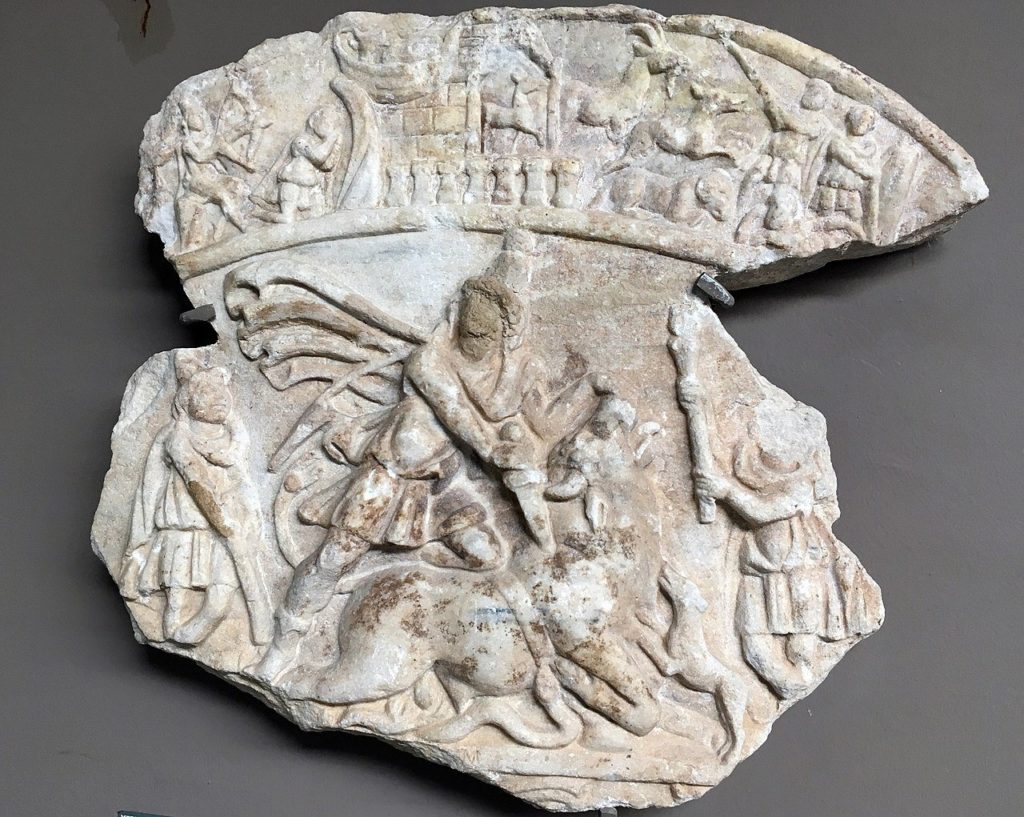
Name: Mithra
Religion: Persian mythology
Realms: God of the rising Sun, friendship, war, covenants, contracts, the seasons, cosmic order, royalty
Fun Fact: Conspiracy theorists believe that this ancient god was poached by Christianity to create Jesus
READ MORE: Ancient Persia: From the Achaemenid Empire to the History of Iran
Your adventure ends with a movie moment; you and Mithra are sitting on your front porch watching the sun rise back to its rightful place in the sky. It’s fitting that he’s with you to witness the moment. After all, he is the god associated with the rising Sun.
But Mithra isn’t there for the view alone — although he did enjoy your coffee and rusks while watching dawn break into day. Instead, this god appreciates order. For thousands of years, he has wielded his power to keep the seasons and cosmos ticking like clockwork.
READ MORE: The Hands of Time: Who Invented the Clock?
Back in the day, Mithra protected kings and gave them a divine right to rule. However, he made them sign a contract to keep the order — but more specifically, the god wanted to see leaders who cared for their people. Neglecting them was a good way to break a covenant with him, and if they did then he removed his support from the king.
Nobody wanted that — this god kept the forces of darkness in check, judged souls in the afterlife, and protected humanity. He’s kind of important.
At the moment, he’s ruffling your hair. He’s impressed with your hijacking shenanigans, but it’s time for order now. The god conjures a contract that states that you will never interfere with divine matters again. It’s not just a matter of signing — Mithra can’t be deceived and knows instantly when someone’s heart isn’t true.
But this time, you don’t doubt your own intentions and scribble your signature on the bottom. You are done with trying to turn a celestial body into profit.
You like Mithra, he seems like a cool guy. And it’s not every day that one gets to meet a Persian god that is still worshipped. These days, he’s a Zoroastrian god, but the really incredible fact is that Mithra’s followers have honored him continuously for over 4,000 years.
The Sun Gods Await You in Paradise
Tough day. A weekend at an Incan paradise seems like the perfect way to unwind.
After rifling through Kinich Ahau’s gift basket, you use the calendar to pick your date and start packing. Things turned out pretty well — besides the threats and bribes from the angrier gods. But you’ve also befriended a few, and solar mythology is coming out of your ears.
Speaking of which, you might not know which of these gods and goddesses owns the sun, but it’s easy to see why they were once so widely revered. If anything, the gods taught you the precious connection between the Sun and life — without daylight, the world as we know it cannot exist.
Alright, enough drama. Aquatic Maya paradise, here you come.